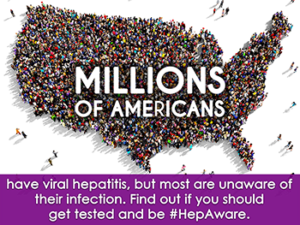Rome, GA: May is Hepatitis Awareness Month, and the Georgia Department of Public Health Northwest Health District urges people to assess their risk of having viral hepatitis and find out if they should get tested or vaccinated. District Health Director Dr. Unini Odama encourages people to visit https://www.cdc.gov/hepatitis/RiskAssessment for a free online assessment developed by the CDC.
The assessment takes only five minutes and will provide personalized testing-and-vaccination recommendations for hepatitis A, hepatitis B, and hepatitis C. Each of the ten Northwest Health District county health departments offers hepatitis testing and vaccination. You can find their locations and contact information at https://nwgapublichealth.org/counties.
Hepatitis A is a highly contagious liver infection that can range from a mild illness lasting a few weeks to a severe illness lasting several months. The hepatitis A virus is usually spread when a person ingests the virus from contact with objects, food, or drinks contaminated by feces or stool from an infected person. Hepatitis A can be easily prevented with a safe and effective vaccine, which is recommended for all children at one year of age and for adults who may be at risk. 1
Hepatitis B is a liver disease that results from infection with the hepatitis B virus. For some people, especially those infected as infants, the infection leads to a chronic or lifelong illness. The hepatitis B virus is spread primarily when blood, semen, or certain other body fluids from a person infected enters the body of someone who is not infected. 1
The virus can be spread through sexual transmission and through contact with blood, such as sharing injection drug equipment. The hepatitis B virus can also be passed from an infected woman to her baby at birth. It is recommended that all infants at birth, and anyone else at increased risk, receive the hepatitis B vaccine to hopefully prevent infection. 1
Hepatitis C is a liver disease that results from infection with the hepatitis C virus. According to the CDC, baby boomers, people born from 1945 through 1965, are five times more likely to be infected with hepatitis C than other adults. 1
Most people who become infected with the virus go on to develop a chronic infection that causes serious liver problems. The hepatitis C virus is usually spread when blood from a person infected enters the body of someone who is not infected. Today, most people become infected with hepatitis C by sharing needles, syringes, or any other equipment to inject drugs. 1


